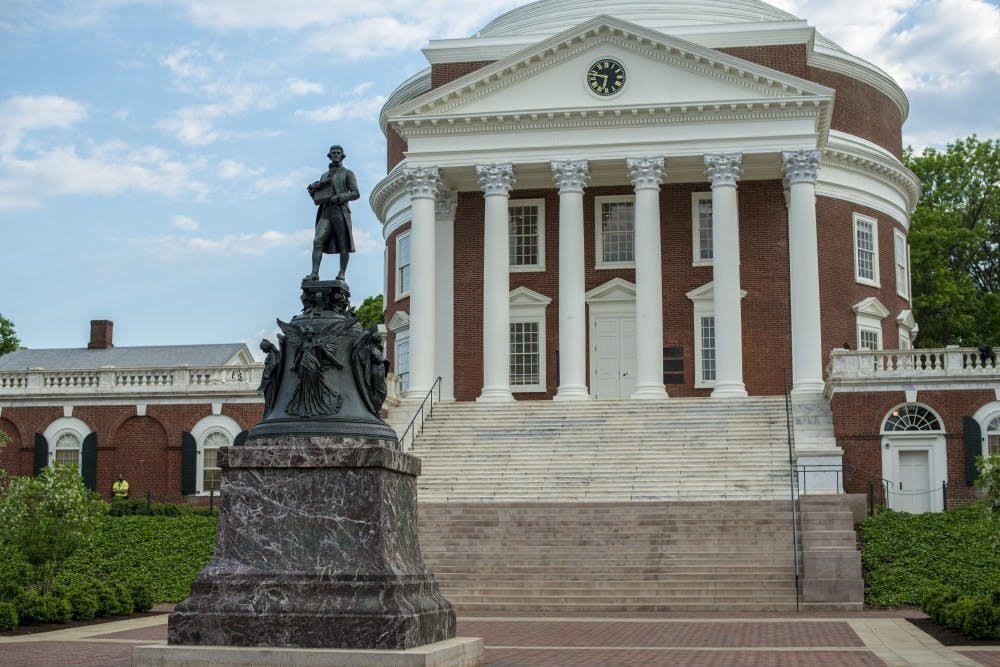Lea en español
Governor Ralph Northam signed a bill April 1 that will require five major public universities in Virginia to make reparations for their ties to slavery. Under this new legislation, the University — along with Longwood University, Virginia Commonwealth University, the Virginia Military Institute and the College of William & Mary — are required to identify and memorialize the enslaved people who worked for their universities as well as offer a “tangible benefit,” such as a college scholarship or community-based development program, for individuals and communities with historic ties to slavery.
These universities were chosen because they were established prior to the end of the Civil War and had a history of using enslaved laborers to build their campuses. An estimated 4,000 enslaved and free laborers worked at the University from 1817 to 1865, and over 500 have been identified by name.
According to University spokesperson Wes Hester, the University has already met the first provision of the legislation through the construction of the Memorial to Enslaved Laborers.
The second provision will require working with the State Council for Higher Education to evaluate ways that the University can support descendants of enslaved laborers.
“We are committed to that work, which will soon begin,” Hester said.
The Memorial to Enslaved Laborers was proposed over a decade ago as a way to pay tribute and commemorate the hundreds of enslaved laborers who helped build the University. The names of known enslaved laborers are listed on the memorial, along with 4,000 memory marks in honor of those who have not been identified. While construction was completed last spring, the official dedication ceremony was postponed due to the COVID-19 pandemic.
On April 10, one year after the originally scheduled date, a virtual ceremony was held to officially dedicate the memorial — part of a series of events to celebrate the legacies of enslaved laborers at the University.
The bill — which establishes the “Enslaved Ancestors College Access Scholarship and Memorial Program” — prevents universities from using state funds or tuition fee increases to meet the two provisions. The State Council of Higher Education will collaborate with the universities to establish eligibility criteria and guidelines for implementing the program and identifying enslaved individuals. According to the bill, each university will be required to continue these efforts for a period equal to the length of time during which enslaved individuals were used to maintain the institution or until scholarships have been awarded to a number of recipients equaling 100 percent of the identified population of enslaved laborers.
Myra Anderson, a Charlottesville resident and descendant of the University’s enslaved community, has been advocating for the school to extend scholarships to relatives and following the passage of the legislation has urged the University to commit to these scholarships.
In 2018, the President’s Commission on Slavery and the University submitted a report to then-University president Teresa Sullivan, recommending that the University increase African American scholarship programs and establish a scholarship fund designated for descendants of enslaved communities. Black student activists expanded upon these demands in a statement to the University’s racial equity task force in July 2020, calling for the creation of scholarship programs specifically for descendants of enslaved laborers who built the University and the surrounding Charlottesville community.
In an interview with The Cavalier Daily in March, University President Jim Ryan said that the University has talked about creating scholarships with a preference for descendants of enslaved laborers. Ryan previously mentioned the legal complications the University might encounter if scholarships were directly provided to descendants of enslaved laborers due to a previous ruling by the Fourth Circuit Court of Appeals that said race-based scholarships were unconstitutional. However, he did add that a law from the General Assembly would help mitigate concerns on the University level.
As a separate foundation from the University, the Alumni Association currently runs the Ridley Scholarship Fund, which “seeks to attract and retain the nation’s most meritorious African-American students” to the University.
The Enslaved Ancestors College Access Scholarship and Memorial Program will officially come into effect during the 2022-2023 academic year.
The nonprofit Descendants of Enslaved Communities at the University and the University’s Descendant Project are working to identify and connect relatives of the University’s 4,000 enslaved and free laborers.







